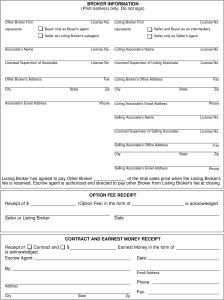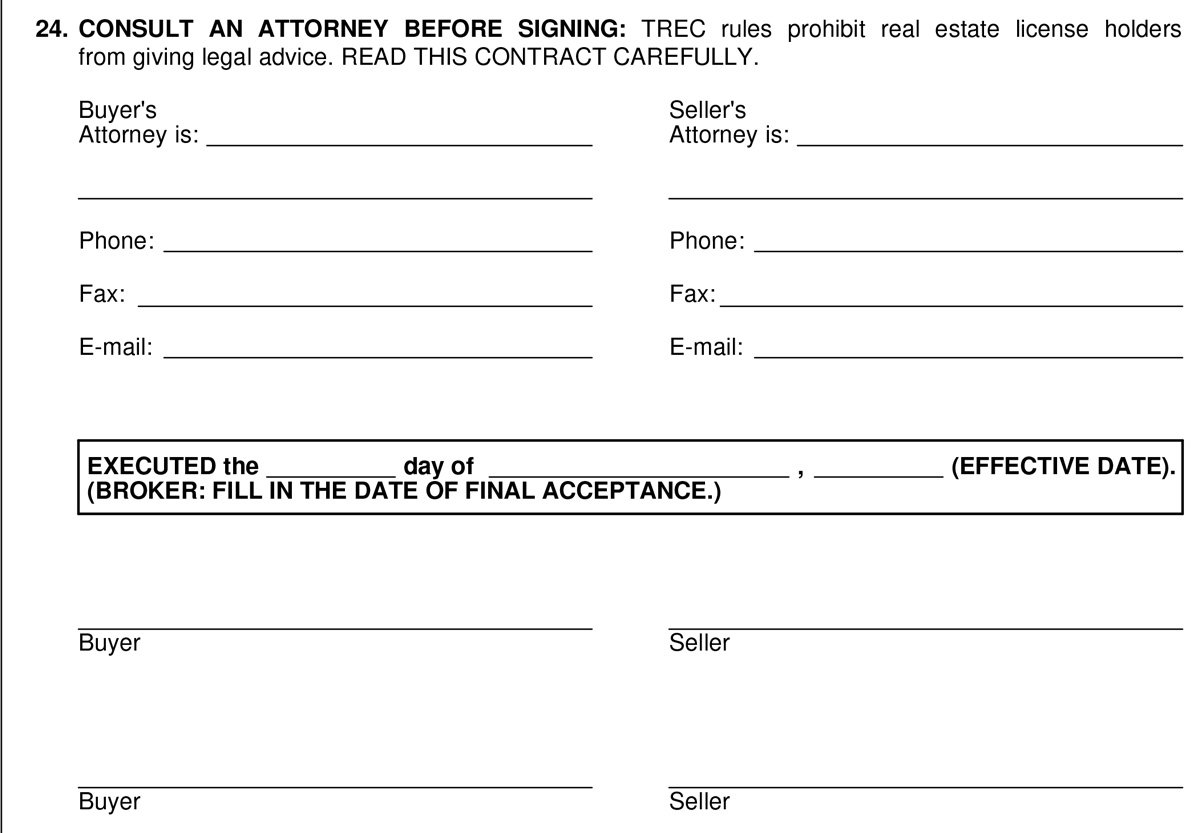 Note: The Texas Association of Realtors and TREC update promulgated forms regularly. For the most recent updates, check with TAR, TREC, or contact me at brian@starpointerealty.com.
Note: The Texas Association of Realtors and TREC update promulgated forms regularly. For the most recent updates, check with TAR, TREC, or contact me at brian@starpointerealty.com.
Note: I am a real estate professional, not a lawyer. Nothing herein should be construed as legal advice or instructions.
BLUF
- Realtors are not lawyers.
- The execution date is after all buyers and sellers sign and at least one agent receives a complete copy of that signed document.
- Executed contracts are sent directly to the lender and title company, and starts the clock ticking on all timelines (option period, earnest money and option fee timeline in particular).
The previous paragraph dealt with option periods: Paragraph 23: Termination Option. Now is the last paragraph, reviewing your attorney and signing.
Paragraph 24. Real estate agents are not (usually) attorneys. We are trained on these contracts and should be able to explain them reasonably thoroughly. However for questions about non-promulgated amendments, “what-if” scenarios, legal implications of certain actions, and just about anything you are not comfortable with after reading the contract then you should talk to a lawyer. Your real estate agent can recommend one!
You can fill in your lawyer’s information here. I have not yet had a buyer or seller use a lawyer for these contracts, but would always encourage one to do so if they have questions. Most often, I see agents leave this either blank or fill in “Buyer’s/Seller’s Choice”, respectively.
If everything in the contract looks good, then it is time for the buyer or seller to sign! There aren’t any special rules about the signature (e.g. full legal name, include middle initial etc). Just your signature will do!
Also be sure you initialed all the previous pages, as well as initial and sign any amendments that are included.
Texas allows e-signatures on its legal documents. I, for example, use DocuSign to email these documents to buyers or sellers to digitally initial and sign – never even printing out the contract. It’s also great because the client will instantly have a digital copy of what they’ve signed instantly, right there on their computer, without having to print, copy or scan anything.
 Page 9 of the contract is the brokerage information and option fee/earnest money receipts. These are important for the agents who are ensuring their information is correct, buyer’s agent commission is reflected, and can prove when they deposit the earnest money and option fee (usually a buyer will give these two checks to their agent who will deposit it for them). However there are no signatures; a buyer or seller does not really need to worry about this page.
Page 9 of the contract is the brokerage information and option fee/earnest money receipts. These are important for the agents who are ensuring their information is correct, buyer’s agent commission is reflected, and can prove when they deposit the earnest money and option fee (usually a buyer will give these two checks to their agent who will deposit it for them). However there are no signatures; a buyer or seller does not really need to worry about this page.
And that is it! You are under contract! It shouldn’t be scary. Buying or selling a home is a major and somewhat complicated process. But the Texas Association of Realtors has built, adapted and edited this contract after years and years of experience dealing with the real estate transaction, and it is designed to protect both buyer and seller throughout the transaction.
Choosing a competent and educated agent to help you through the contracts is important as well. In particular, I would recommend agents who have the GRI (Graduate Realtor Institute) designation (like I do). The course was everything I should have learned in the real estate licensing course, and especially focused on knowing the contract front and back. It was my education and resources from both my own local experiences and the GRI from which I composed this information on the contracts.
Questions? Need help? Have feedback? Email me at brian@starpointerealty.com or post it to the Facebook comments below for everyone to see!

